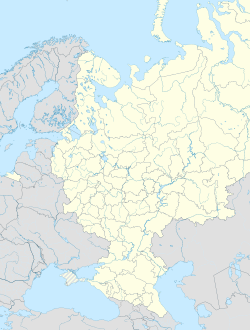Ponarth
| district
Ponarth
Dimitrovo
|
||||||||||||||||||
|
||||||||||||||||||
|
||||||||||||||||||
Ponarth was a district of Königsberg (Prussia) since 1905 and is called in today's Kaliningrad Russian Димитрово Dimitrowo . Dimitrowo belonged to the Baltic Rajon , the southwestern district of Kaliningrad, from 1947 to 2009 , and since 2009 to the Moscow Rajon , into which the Baltic Rajon has merged and which now encloses the entire area south of the Pregel .
Geographical location
Ponarth is located in the south of Kaliningrad and is four kilometers from the city center. An insignificant side street leads through the district, which at Novo-Doroschny (Hoch Karschau) meets an urban bypass that joins the Russian trunk road A 194 (former German Reichsstrasse 1 ) with the trunk road R 516 (former German Reichsautobahn Berlin – Königsberg " Berlinka ") ) connects. Previously Ponarth was a train station by name, today there is only one Ostranowotschny point ("Haltpunkt") called Kijewskaja on the railway line from Kaliningrad to Mamonowo (Heiligenbeil) for onward travel to Poland (former Prussian Ostbahn ). Before 1945, Ponarth was an excursion destination for the Königsbergers on Sundays, who enjoyed the high, wild trees of the village and the view of the city.
Surname
The name Ponarth [en] is derived from Prussian . The prefix “pa” or “po” means “under” and “nártas” (angle) and can thus be regarded as the place “under the angle”. The etymology of the name parts of "Ponarthen" is broken down in the Lithuanian dictionary Prūsu kalbos etimologijos žodynas 'Prussian Etymology Dictionary' as * Pànartʹan and * Nartā (flow, pump) and * narstantis (submerge, swirl in the river). Since the place is in the Pregel glacial valley , the name probably suggests a floodplain.
history
Already in 1328 a brother Conradt was given two Hufen land in the area of "Ponartten" at his own disposal and without any obligation to pay ("zum schultzenn apmt zu etwigen zeitten gantz frey and one alle complaining to own") by the house commander in the Brandenburg brother Ruggertus from N . overwritten. This Conradt held the Schulzenamt and he was entitled to another share of the mentioned place. Sealed by Brother Hermannus von Kodorff, Brother Leo, Brother Otho von Bere Solbe, Brother Theodorius von Brabandia, Brother Otho von Wollmenstein and others on the day ( December 21st ) of the Apostle Thomae in the year of the Lord 1328.
In 1385 the village was mentioned in a document, in 1410 it was called Ponarthen. Ponarth used to be an independent village with a large number of workers. In 1874 an administrative district (Prussia) Ponarth was formed, which consisted of the communities Ponarth, Groß Karschau, Hoch Karschau (now Russian: Nowo-Doroschny), Klein Karschau and Schönbusch (now also called "Dimitrowo") and was administered from Groß Karschau . He belonged to the district of Königsberg (Prussia) in the administrative district of Königsberg in the Prussian province of East Prussia . On October 14, 1893, the village of Schönbusch was incorporated into the rural municipality of Ponarth.
In 1895 there were 4425 inhabitants in Ponarth. There was a postal agency, a telegraph office, the main royal railway workshop, and two major breweries. Ponarth was moved to the city of Königsberg i. Pr. Incorporated, in 1906 the district was dissolved and the official seat moved to Groß Karschau.
On the Palve Square wearing MTV Ponarth its home games in the sports of football , handball , racquetball and Fistball out.
Ponarth became famous for its good beer. Today's Russian drink called “Ponarther Bier” comes from Devau . More recently, the amber room was suspected to be in the decaying brewery buildings .
Personalities

- Johann Philipp Schifferdecker (1811–1887), brewery owner
- Eduard Schifferdecker (1833–1915), brewery owner and patron saint of the church
- Heinrich Kemke (1864–1941), German librarian, prehistorian and curator at the Prussia Museum
literature
- Ernst Hartmann: The history of the village of Ponarth near Künigsberg i. Pr. Johann Gottfried Herder Institute, 1963 ( opacplus.bsb-muenchen.de ).
- Ludwig von Baczko: An attempt at a history and description of Königsberg. 2nd, completely revised edition, Goebbels and Unzer, Königsberg 1804 ( reader.digitale-sammlungen.de ).
- Georg Gerullis: The old Prussian place names. Berlin / Leipzig 1922, p. 130 ( portal.dnb.de ).
- Ponarth . In: Meyers Großes Konversations-Lexikon . 6th edition. Volume 16, Bibliographisches Institut, Leipzig / Vienna 1908, p. 144 .
Web links
- Situation map picture archive East Prussia
- Image of the Ponarther Church
- Image of the Ponarth brewery
Individual evidence
- ↑ Georg Gerullis: The old Prussian place names. Berlin / Leipzig 1922, p. 130 ( portal.dnb.de ).
- ^ A b Ernst Hartmann: The history of the village of Ponarth near Künigsberg i. Pr. Johann Gottfried Herder Institute, 1963, pp. 1–2 ( opacplus.bsb-muenchen.de ).
- ↑ Vytautas Mažiulis: Prūsų kalbos etimologijos žodynas . tape 3 : L-P . Mokslas, Vilnius 1996, ISBN 5-420-00109-8 , p. 325-326 ( [1] ).

